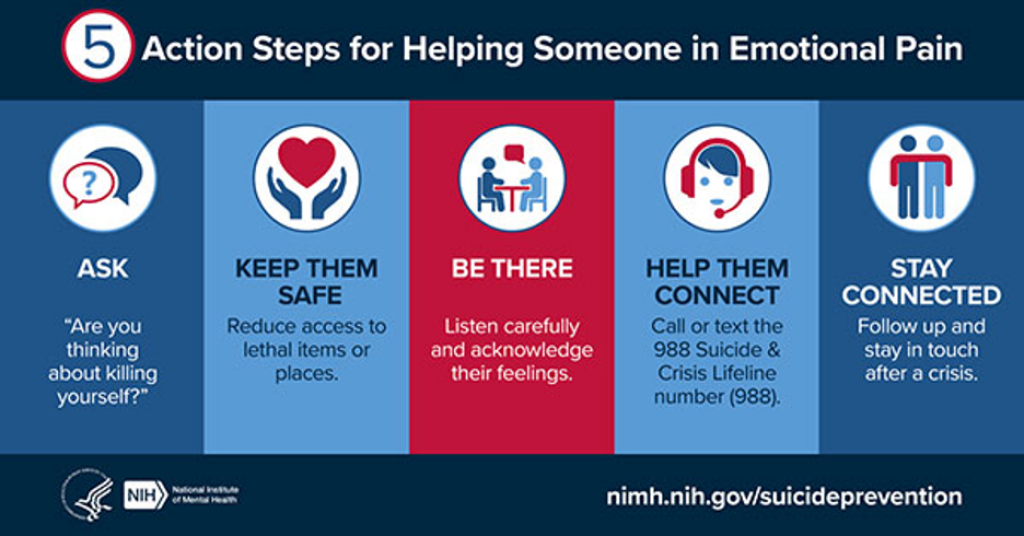Recognizing the risks and signs of suicide
National Suicide Prevention and Awareness Week, an annual week-long campaign in the United States, is this week. This week seeks to not only inform and engage others on the topic of suicide for prevention purposes, but to also bring awareness to the warning signs.
Suicide is something many of us may have been touched by in some way and it’s a difficult topic for many to understand, especially when we find a loved one struggling.
Statistics show one in 10 college students have seriously considered suicide. Suicidal thoughts, making plans for suicide and suicide attempts are highest among adults ages 18-25. It’s also the third leading cause of death for 15 to 24-year-olds. However, any age can be at risk.
Risk factors at any age include:
- Depression
- Low self-esteem
- Mental illness
- Substance abuse or dependence
- Eating disorders
- Family history of suicide
- Self-harm
- Prior suicide attempt
- Situational crisis
Know the signs of suicide or suicidal thoughts
Suicide is very real and serious and there are ways friends, family, counselors, teachers, coworkers and loved ones can help prevent this tragic outcome and support those experiencing suicidal thoughts. First and foremost, being aware of signs to look for in those who are vulnerable is important in aiding in the prevention of suicide.
Be aware of any of the following signs:
- Talking about suicide or preoccupation with death
- Isolation and withdrawal from friends and family
- Statements of feeling worthless, hopeless, helpless
- Dramatic changes in mood
- No sense of having a reason to live
- Loss of interest in things they typically care about
- Giving away valued possessions
- Unexplained anger, aggression or irritability
- The loss of an important relationship
How to support a loved one through challenges
One of the most challenging things when we have a loved one struggling with any of these issues is the fear we may say the wrong thing, or if our questions about if they are experiencing suicidal thoughts will put the idea in their head and potentially cause them to go through with it. This isn’t the case.
If you notice a friend or loved one who is struggling, there are some helpful questions you can ask to start:
- Have you been feeling sad or down lately?
- How has your mood changed recently?
- How has your stress increased?
- What stressful events have happened recently in your life?
- Have you had thoughts of hurting yourself?
- Have you felt so bad you’ve had thoughts of going to sleep and not waking up, dying or ending your life?
These questions convey a sense of care for the person struggling and don’t add to what they may already feel. If suicide is something they have thought about, typically that person has already had ideations, and they weren’t brought on by your inquiry.
 It’s possible you may be one of the first people to show a genuine level of concern. What if they simply needed to verbalize what they were feeling? It’s OK to ask questions and talk to them about their feelings and struggles.
It’s possible you may be one of the first people to show a genuine level of concern. What if they simply needed to verbalize what they were feeling? It’s OK to ask questions and talk to them about their feelings and struggles.
If there are concerns your loved one is at risk of suicide, ask them about their support system and remind them you are also part of that support system. Call the Suicide & Crisis Lifeline at 988 with them so they can talk to a professional. Stay with them until they are in a safe space, and if further help is needed, take them to the local ER or hospital for an evaluation.
The common myths about suicide
There are many myths surrounding suicide that are important to know and understand. For example, asking someone about suicide will not increase the risk of suicide. Having this conversation reduces anxiety, opens the lines of communication and lowers the risk.
Another myth is that only experts can stop a suicide. Anyone can stop a suicide; listen, show you care and provide hope. We all may have heard that suicidal people don’t talk about it, but most suicidal people have given some sort of clue or have communicated an intent prior to an attempt.
Another suicide myth is that those who talk about it, don’t do it. However, this is not the case either. If someone talks about it, ask them questions, listen and offer support.
A popular myth I heard recently is that once a person decides to attempt suicide, no one can change their mind. Suicide is a preventable form of death, and any positive action can help save a life. If a person in crisis gets the help, he/she needs, they are far less likely to attempt suicide.
Resources for preventing suicide
Suicide is a difficult subject for most to think about, much less discuss. But know that suicide is preventable.
There is 24/7, free and confidential support available through the 988 Suicide & Crisis Lifeline, both over the phone and through chat in English and Spanish. Your local emergency center can also help when you may not know what to do.
Written by Staci Garner, LPC-S, director of counseling for Buckner Family Pathways®.




Add a Comment